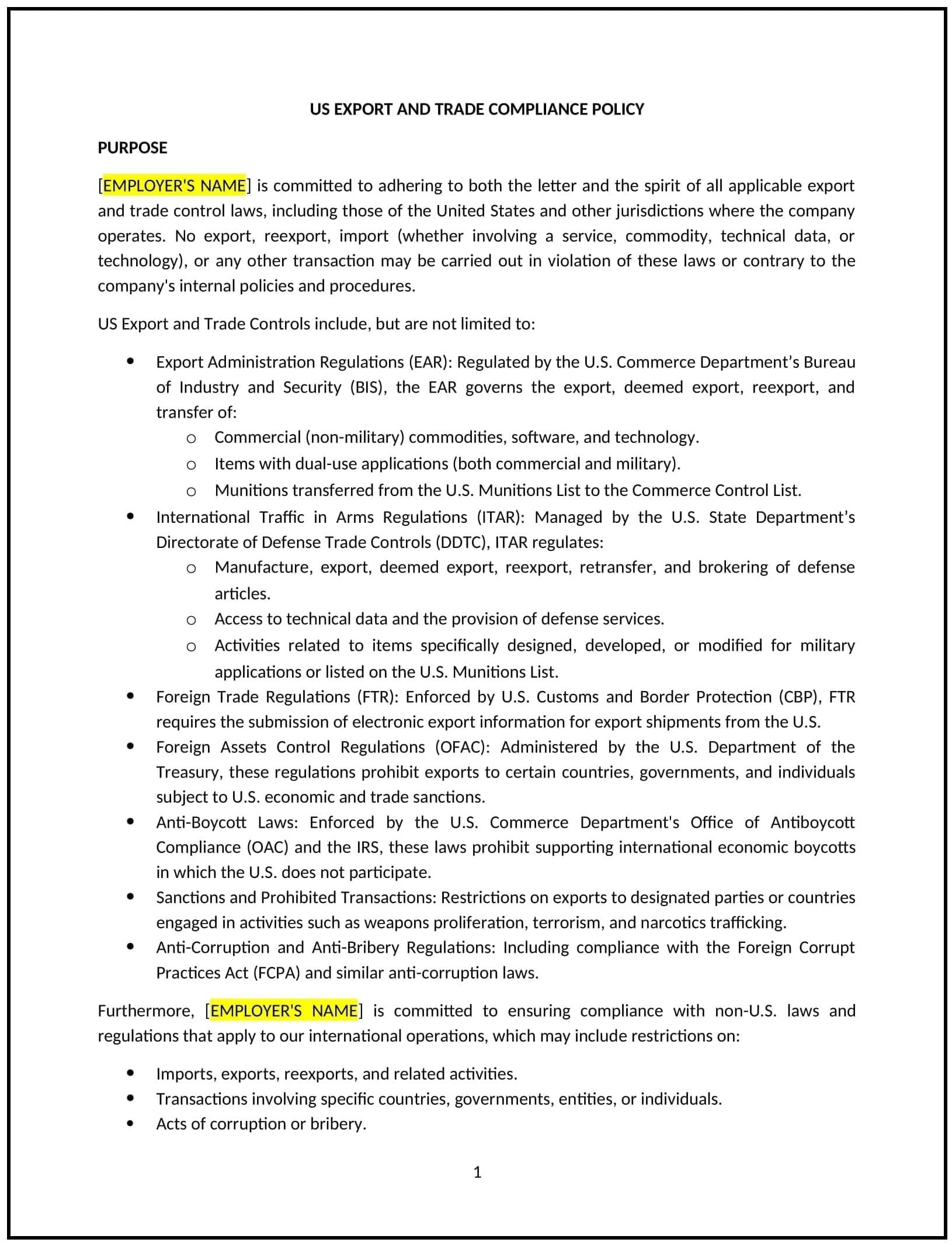US export and trade compliance policy (Missouri): Free template
Got contracts to review? While you're here for policies, let Cobrief make contract review effortless—start your free review now.

Customize this template for free
US export and trade compliance policy (Missouri)
A US export and trade compliance policy helps businesses in Missouri ensure they adhere to federal and state regulations related to international trade, including the export of goods, services, and technology. This policy outlines the procedures for compliance with U.S. export laws, including those governed by the Bureau of Industry and Security (BIS), the U.S. Department of Commerce, and other regulatory agencies. It is designed to protect the business from legal risks, ensure ethical trade practices, and support compliance with both domestic and international laws.
By adopting this policy, businesses can reduce the risk of violating export laws, safeguard their reputation, and support the responsible global movement of goods and services.
How to use this US export and trade compliance policy (Missouri)
- Define export regulations: Clearly outline the key U.S. export control laws and regulations that apply to the business, such as the Export Administration Regulations (EAR), International Traffic in Arms Regulations (ITAR), and sanctions programs from the Office of Foreign Assets Control (OFAC).
- Establish responsibilities: Specify the responsibilities of employees and departments involved in the export process, including compliance officers, legal teams, and operational staff. Ensure that all staff members are aware of their roles in ensuring compliance.
- Set procedures for due diligence: Establish procedures for performing due diligence on customers, business partners, and end-users of exported goods or services to verify they are not involved in prohibited activities or located in embargoed or restricted countries.
- Define restricted parties and countries: Identify the restricted parties and countries, including those subject to U.S. sanctions, embargoes, and trade restrictions. Provide guidelines for checking if transactions involve restricted parties or countries before proceeding with export activities.
- Establish record-keeping requirements: Define the documentation and record-keeping requirements for all export transactions, including contracts, shipping records, licenses, and communication with authorities. Specify how long records should be retained and the process for maintaining confidentiality.
- Outline training and education: Implement a regular training and education program to ensure that employees are aware of the latest export compliance regulations and understand their role in the company’s trade operations.
- Review and update regularly: Periodically review and update the policy to ensure it remains in compliance with evolving U.S. export regulations, industry standards, and changes in Missouri state law or business operations.
Benefits of using this US export and trade compliance policy (Missouri)
This policy provides several benefits for businesses in Missouri:
- Reduces legal risks: A clear export and trade compliance policy reduces the risk of violations of U.S. export laws, minimizing the potential for penalties, fines, or restrictions on doing business internationally.
- Enhances business credibility: By adhering to U.S. export laws, businesses demonstrate their commitment to ethical trading practices, which can enhance their reputation with customers, business partners, and regulatory bodies.
- Ensures smooth international transactions: A well-defined compliance policy ensures that businesses can navigate international trade smoothly and avoid unnecessary delays caused by compliance issues.
- Protects against sanctions violations: By maintaining awareness of restricted parties and countries, businesses reduce the risk of inadvertently violating U.S. sanctions, which can lead to severe legal consequences.
- Supports responsible global business practices: The policy encourages businesses to engage in responsible trade, ensuring that exports comply with both U.S. law and international regulations, contributing to global stability and security.
- Improves employee awareness and engagement: Regular training and clear guidelines ensure that employees are engaged and understand the importance of compliance, reducing errors or oversights that could jeopardize trade activities.
Tips for using this US export and trade compliance policy (Missouri)
- Communicate the policy clearly: Ensure that all employees involved in export activities are aware of the US export and trade compliance policy, understand the procedures, and know who to contact for guidance or clarification.
- Regularly update training: Provide ongoing training sessions to keep employees up-to-date on the latest regulatory changes, especially as export controls and sanctions programs may change frequently.
- Monitor transactions closely: Establish a monitoring system to ensure that all transactions comply with the policy, including regular checks of customers, partners, and shipments against restricted lists or embargoed countries.
- Promote a culture of compliance: Encourage employees to report any potential violations or concerns about export practices, fostering a culture where compliance is prioritized and valued.
- Review and audit regularly: Conduct periodic audits of export activities to ensure that the policy is being followed and that any potential risks are identified and addressed in a timely manner.
- Review regularly: Periodically review and update the policy to reflect changes in Missouri state laws, new export control regulations, or other relevant changes in business operations or international trade.